
24 minute read
Top (Inter)National Education: A World of Opportunities
From inspiring international schools to higher education and way beyond, in the following pages we bring you a selection of some of the best educational establishments in Belgium and Luxembourg.
PHOTOS: PIXABAY

Education is about far more than just supplying knowledge: a good school provides the groundwork for our future happiness and success, and the benefits of studying in Belgium and Luxembourg are numerous. One of the main advantages is that they both are multilingual countries.
Global community Luxembourg is a diverse, vibrant country, which people of various nationalities call home. This multiculturalism is reflected nowhere better than at the École Internationale de Mondorf-les-Bains (EIMLB). The school may have only opened in September 2018, yet it has already earned a strong reputation, thanks not only to its pioneering pedagogical practices, but also due to the palpable sense of community amid pupils and staff.

World-renowned In neighbouring Belgium, you will find an array of world-class establishments, new and old, whatever your area of interest. For example, there is Vlerick, which was founded in 1953 and is renowned for being one of Europe’s finest business schools. The Institute of Tropical

Medicine Antwerp is at the forefront of research and education when it comes to global diseases. Its research and partnership with countries around the world has helped bolster its medical services and improve public health, according to their motto of ‘global science for a healthier world’.

A better future There are many more pioneering establishments such as Sustainability College Bruges (SCB), which was founded in light of the Sustainable Development Goals of 2015. These global resolutions should make our lifestyle more sustainable by the year 2030.
History Meanwhile, do not miss our article on the Ghent University Museum (GUM), which will open its doors for the first time on 21 and 22 March 2020. The idea for the museum formed out of Ghent University’s enormous collection of artefacts. Since the university opened its doors in 1817, it has collected over 400,000 official pieces.
Whether you are looking to find the perfect school for your child, are in the process of selecting your next stage of education, or are simply seeking food for thought, this month’s special guide is well worth a read. This array of inspiring establishments will provide the necessary foundations for a prosperous future.
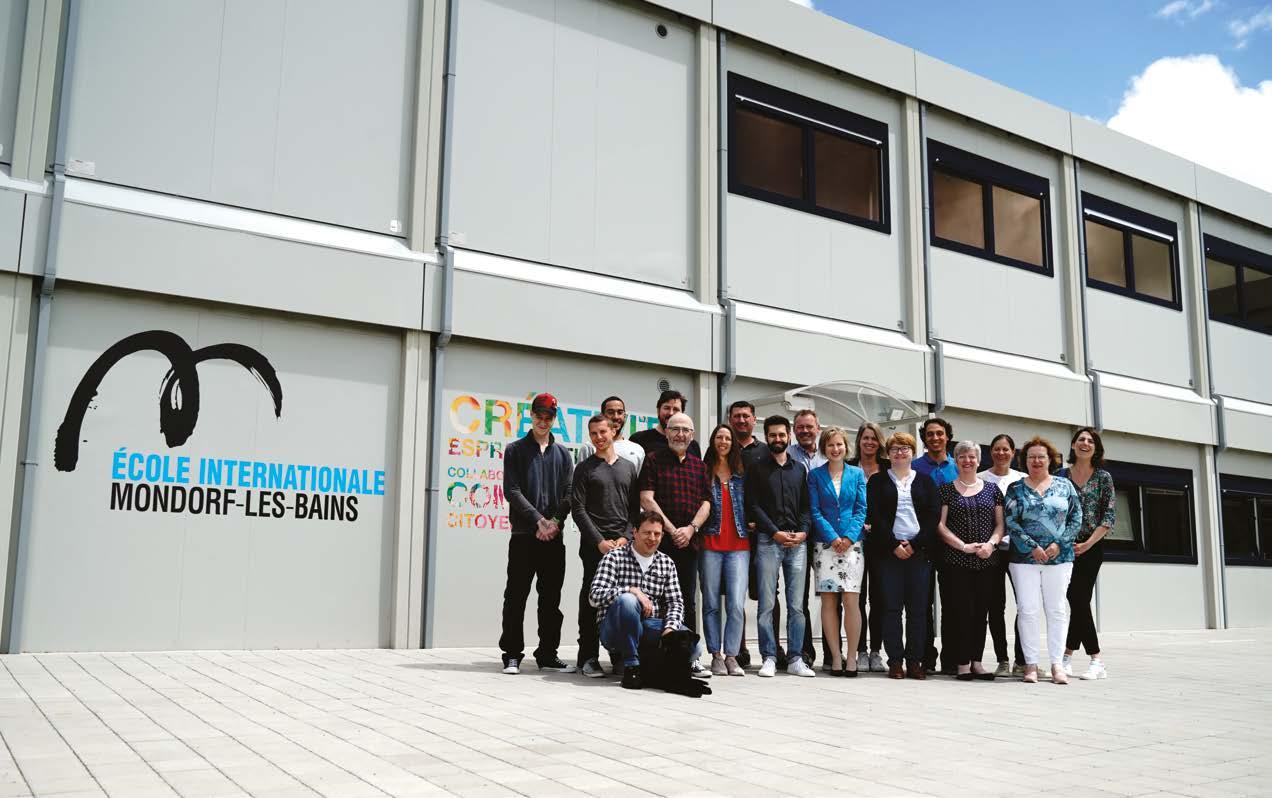
TEXT: ANNA VILLELEGER | PHOTOS: EIMLB / PATRIK BITOMSKY
Luxembourg is a diverse, vibrant country, which people of various nationalities call home. This multiculturalism is reflected nowhere better than at the École Internationale de Mondorf-les-Bains (EIMLB), situated in the country’s desirable Moselle region. The state-run international school, which is divided into a primary section (French and English) and secondary section (French, English and German), may have only opened in September last year, yet it has already earned a strong reputation, thanks not only to its pioneering pedagogical practices, but also due to the palpable sense of community amid pupils and staff. EIMLB counts more than 20 nationalities among its student body, and is proud of its multicultural outlook. “We stress that each class should go for at least one pedagogical trip abroad per year. This could be skiing, or a visit to a major European city,” begins the school’s director Camille Weyrich.
Open to the world The school follows the ‘European offer’, which was put into place by Luxembourg’s Ministry of Education. The European offer is public, and aims for social, democratic and cultural integration, highlighting the position of the school as a social elevator and as the impetus of the European spirit. “One of the strongest aspects of the European offer is the emphasis on language,” notes the director. As an ‘Accredited European School’, EIMLB offers the European Schools’ curriculum, which emphasises a multilingual and multicultural pedagogical approach. This leads to students leaving secondary school with the bilingual European Baccalaureate diploma.
In terms of languages, the EIMLB offers students several choices. In the first year of primary school there are two language sections: French and English. Except for language classes, all subjects are taught in the language of the section. Students choose their first language (learned
at native level) from French, German, English and Portuguese. “This allows most students to use their native language at school,” explains the director. Students choose their second language from French, German and English.
In secondary school, students chooses a third language among French, German, English and Portuguese. Then, in the fourth year of secondary school, a fourth language is taught as an option. Learning Luxembourgish is also compulsory for all pupils in primary school, and in the lower classes of secondary school.
The Dalton Plan In addition to the importance of language and communication, a major influence at EIMLB is the Dalton Plan, a teaching concept developed by American educator Helen Parkhurst (1887-1974). As a young teacher at a rural American school, Parkhurst was faced with the challenge of having to teach a diverse range of students aged from four to 14 in one class. Unable to meet the needs of each individual pupil using traditional teaching methods, Parkhurst created a course principle that allowed students to take ownership of content as independently and individually as possible, by working as often as possible in pairs, groups and autonomously. As Parkhurst discovered, when pupils follow their own interests, it has a huge influence on their individual rhythm and the learning success of each person. The school she founded in New York still exists to this day, and is one of the most esteemed schools in the United States, with an array of wellknown names from the arts, business and law amid its alumni.
While there are similarities to Maria Montessori’s child-centred educational approach, which is favoured in many primary schools, the Dalton Plan is especially well suited to independent learning in secondary pupils, and has been implemented in schools across the world. “At EIMLB we embrace the principles of the Dalton Plan, while following our own path in its pedagogical design,” reveals Mr Weyrich. ‘Freedom within a framework’, responsibility, cooperation and autono
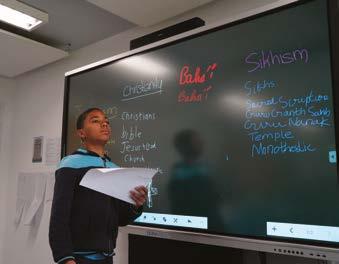
my all form the guidelines of education at EIMLB.
Collaboration While more traditional courses are also followed at the school, students are introduced to independent learning and cooperation with their peers. The goal is to reduce classes where the teacher is the sole focus, with an increased emphasis on the individual interest of each student and their own learning process. “This means the role of the teacher becomes less about providing discipline, and more about advising students in their learning.”
Pupils are encouraged to interact and work constructively together – collaboration is at the heart of the learning experience. “It’s about the pupils working to support each other. The focus shouldn’t
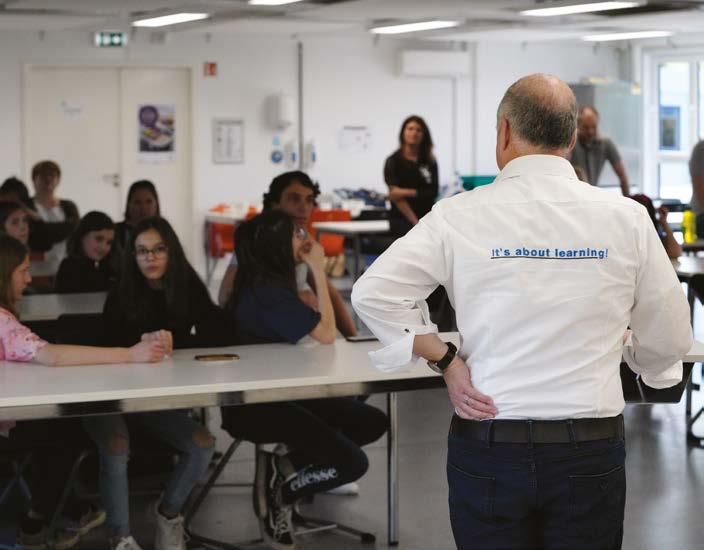
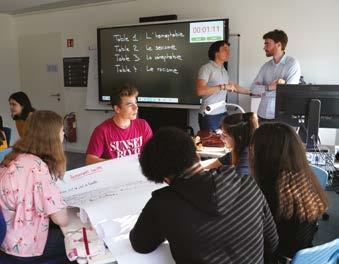
be on the pupil as a ‘lone warrior’,” points out Mr Weyrich. Unlike traditional group work, students at EIMLB partake in a type of small group learning called ‘cooperative learning’, where each student has a responsibility for the group’s learning process. This creates a positive interdependency between the group members and has a positive effect on social interaction, as well as on the group’s academic results.
Courses at EIMLB are organised in blocks of double lessons, meaning the number of subjects per day is limited and provides pupils with the necessary time to deal with a topic in depth, to practice and to review. “Pupils will deal with no more than three to five topics per day, with lessons only ever featuring a maximum of 45 minutes’ worth of traditional teaching,” notes Mr Weyrich.
Putting students at the centre For each six-week learning phase, teachers develop a detailed learning plan for their subjects and classes which can be customised for the particular needs of each student, depending on whether they are particularly gifted in one area or need extra help. “This approach really puts the child at the centre of their education, and gives them the time they need to get to grips with their learning. Some students need more time to focus on the basics, while others work faster and wouldn’t be challenged in a traditional lesson. The teacher can come up with special challenges for extraperforming students.”
Learning plans are primarily implemented in the form of disciplinary or interdisciplinary projects called assignments. For each objective, students have enough educational material to practice and also check for themselves to what extent they have mastered a certain subject. “Working autonomously gives the student the chance to see how well they have understood the lesson, and if they have any problems they can ask their teacher.”
Independence The autonomy really comes into play with the pupils’ self-study periods, which happen during 12 lessons per week. During these sessions, teachers remain in the classroom, while pupils have the opportunity to work independently or visit
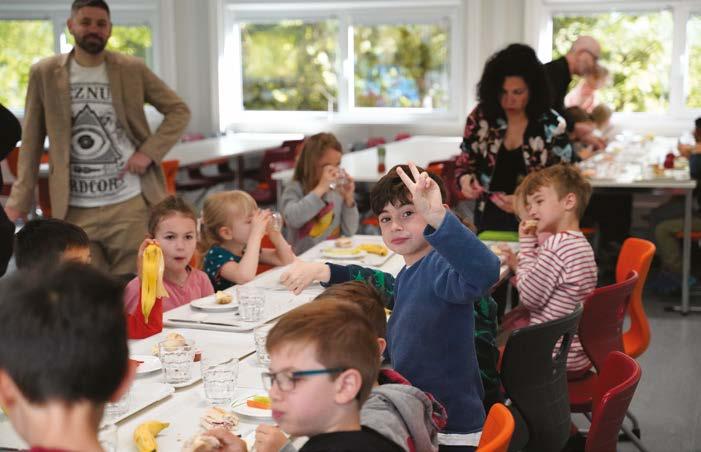
whichever teacher they may benefit from during that time. “This is a perfect opportunity for students who couldn’t keep up in the lesson to seek the support of their teacher. For example, a student could be advanced in English but require more support in maths, so during their autonomous session they could go to their maths teacher. This flexible timetable is a great way to cater for everyone without having to change the specific timetable,” enthuses the director.
Dalton Diary Each learner is responsible for managing their own Dalton Diary, in which they can
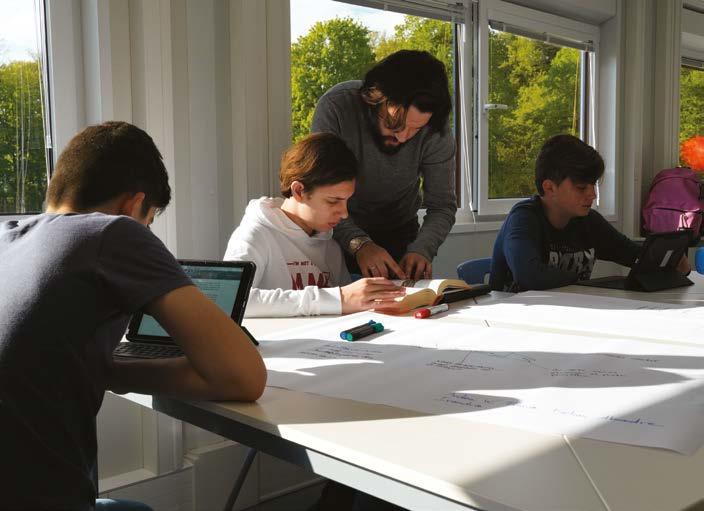
plan their individual learning process, plot their development goals and reflect on what they have learned at the end of each six-week period. Students are responsible for keeping their Dalton Diary up-to-date, and it forms an important link between teachers, students and parents.
Innovation After the successful introduction of iPads in classes this year, September will see the end of traditional paper workbooks for secondary school pupils. “Of course handwriting will always be important, but technology will always be important, too – even more so in the future. It has been astonishing how quickly both the teachers and students have adapted to the iPad. They soon lost all their fears.”
Personal harmony Pupils at EIMLB are provided with a framework to ensure they develop their own sense of personal harmony. “We want to make sure students feel at ease at school,” insists the school’s assistant director Stephan Dumange. In the first three classes of secondary school, pupils are given their own ‘coach’ who they meet with every Friday to discuss any problems they might be having, as well as the positive aspects of their week. Furthermore, pupils have their own portfolio where they reflect in collaboration with their tutor on skills they have developed
outside of traditional school subjects. This could be related to 21st-century skills such as problem-solving, critical thinking and collaboration. “This portfolio could prove to be more interesting to future employers than a student’s actual school results,” muses Mr Weyrich.
Democracy Citizenship is a key focus too, and pupils here learn to have a democratic spirit from an early age. For example, two representatives from each class regularly meet at the School Parliament to debate issues affecting the school community and the evolution of the school. “A democratic approach is practiced every day,” explains the director. “We want everyone to be involved in the processes and decisions that affect the school community.” The Parliament has a specific budget that it has to manage, helping pupils understand the importance of looking after finances. “It isn’t just a matter of teaching pupils about democratic structures, it’s about living within one,” points out Mr Weyrich. “The parliament offers us plenty of inspiration. When they have an idea about how things could be improved, we look to implement their feedback.” A class assembly also takes place every other week, providing pupils with an opportunity to address unanswered questions and discuss the needs of the class.
A school where tolerance flourishes Being compassionate and understanding are fundamental pillars at EIMLB, reflected by the school’s annual Acceptance Day. “One of the primary goals of any school should be to teach pupils about tolerance, respect and acceptance,” asserts Mr Weyrich. The first Acceptance Day took place on 10 May 2019, under the initiative of Mr Dumange. Pupils from both the primary cycle and the secondary cycle participated in Acceptance Day, with the school being transformed for half a day into a large platform of thematic workshops.
Working in groups, pupils considered a main theme to discuss from a list of suggested examples of intolerance, such as xenophobia, homophobia and sexism, and gave presentations using a range of resources including video and PowerPoint. “Even between children of the same cultural origin, differences in socialisation can appear, depending on the family environment and the environmental conditions in which the child is growing up,” explains Mr Dumange. “If differences are not explored, they can become misunderstood, and a cause of subconscious intolerances. So we decided that, once a year, we would have a day focusing on accepting the differences between all the types of people in the world.” Self-expression Creativity is nurtured at EIMLB, with pupils being encouraged to express themselves. One of the ways in which they are motivated to do this is by the many opportunities for extra-curricular activities. “These help the pupils discover personal interests, which could be intellectual, creative or sporty. Just some of the activities include chess, drama, archery, robotics, or working on the school magazine,” reveals the director.
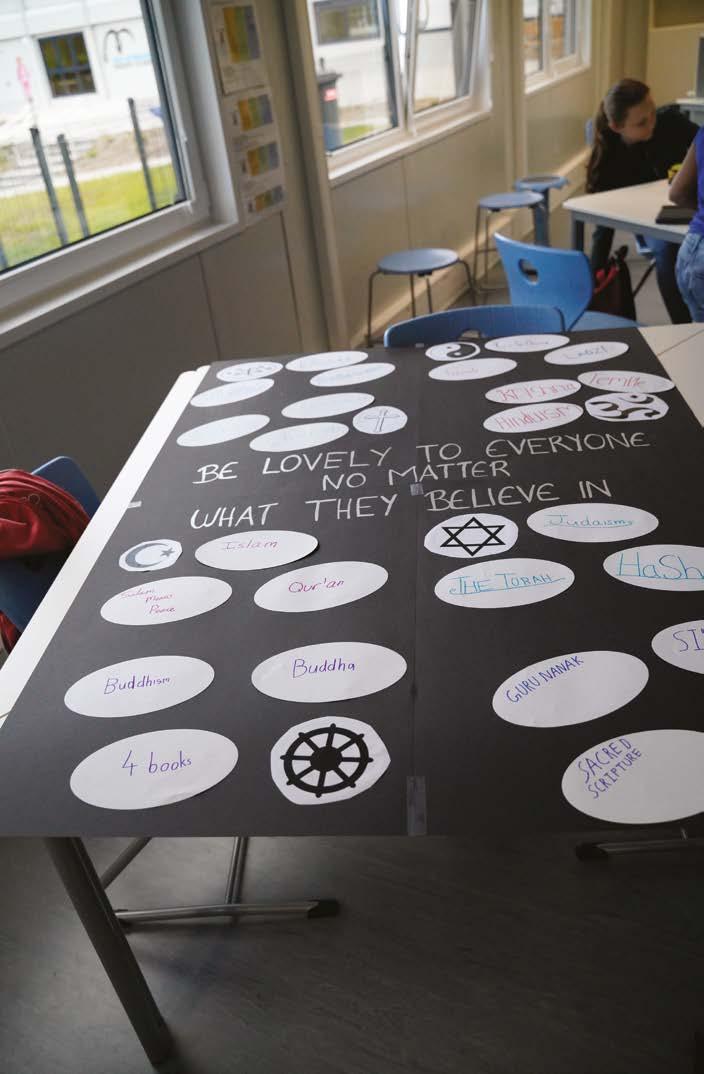
Support service All primary pupils can enrol at the school’s education and support service, SEA, which is located in the school building and is open Monday to Friday, 7am to 7pm. The children are welcomed at SEA before classes begin, they then spend lunchtime there with the socio-educational staff and their classmates. Meanwhile, in the afternoon there are various extracurricular activities, as well as free play and the opportunity to receive help with homework. “I used to say that in a ‘traditional’ school, life began when the bell rang at the end of the day. But we offer a full-day model from 7am to 7pm. Real life happens at school. It’s not all about academic activities, it’s about getting to know each other and developing interests,” enthuses Mr Weyrich.
During the school holidays, SEA remains open, organising various activities for the children including workshops, sports and excursions. “The children go on various outings around Luxembourg and the neighbouring countries. Today, for example, they have gone to the Eifel National Park in Germany,” smiles the director.
Finding their vocation The secondary school also has a socio-educational service, MESA (which stands for Motivation, Education, Social, Accompanying) and organises socioeducation projects in close collaboration with the teachers, as well as coordinating extracurricular activities, and much more. A successful MESA scheme involves organising day-trips to specific locations related to pupils’ particular talents. These could be related to sport, technology or the arts. “This really helps foster students’ specific interests. It means everyone gets to know about ‘real life’ outside school,” concludes Mr Weyrich. “Our pupils gain a true understanding into how the world works.”
École Internationale Mondorf-les-Bains 2, route de Burmerange L-5659 Mondorf-les-Bains | A World of Opportunities
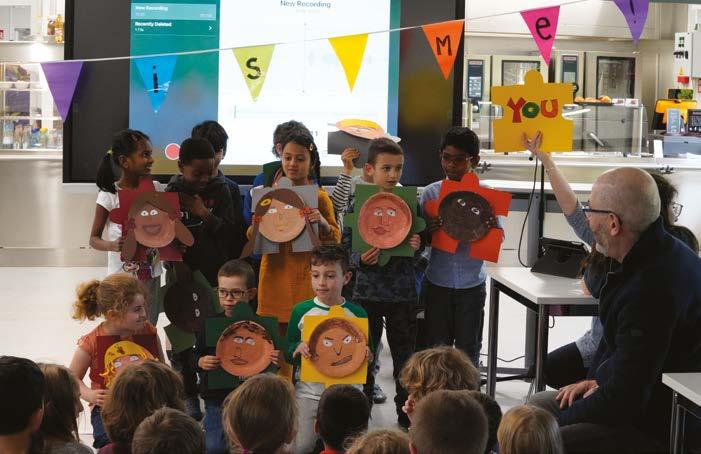
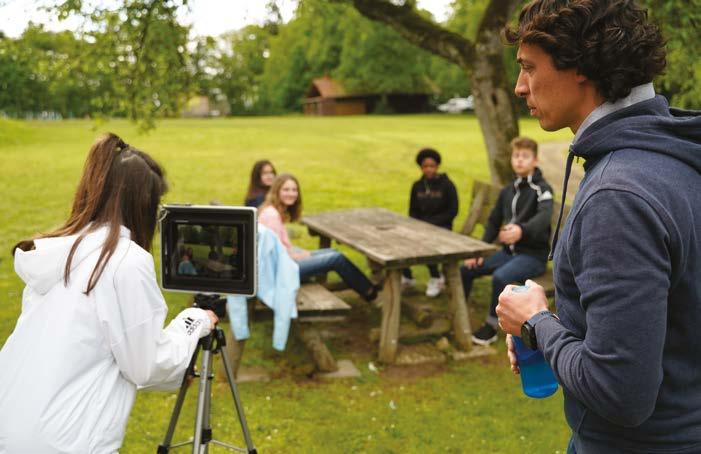
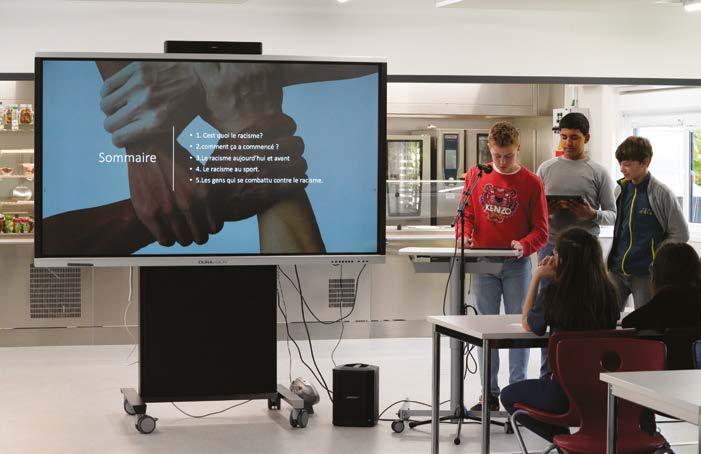
To find out more about EIMLB, visit: www.eimlb.lu
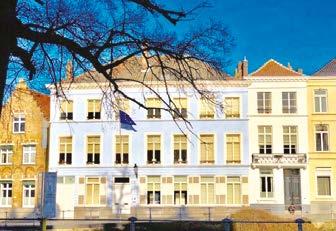
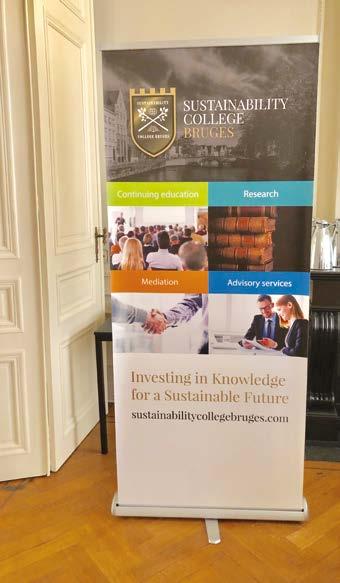
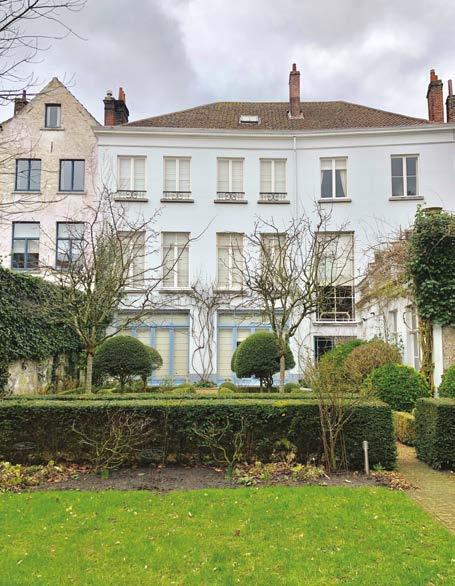
The practical academic way towards sustainability
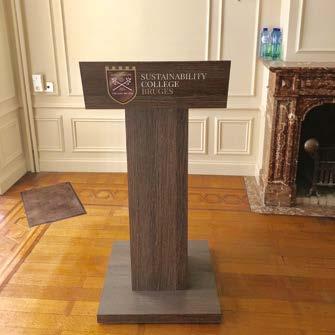
TEXT: ARNE ADRIAENSSENS | PHOTOS: SUSTAINABILITY COLLEGE BRUGES
Essentially, a school is an oasis of fact-based knowledge. In that spirit, professor Kurt Deketelaere has founded Sustainability College Bruges: an academy in the broadest sense of the word, where information about the feasibility of a durable lifestyle is gathered, used and spread.
Sustainability College Bruges (SCB) was founded in light of the Sustainable Development Goals of 2015. These global resolutions should make our lifestyle more sustainable by the year 2030. “The Sustainability College Bruges looks into four themes within this pact,” says chairman Kurt Deketelaere. “These are energy, the environment, climate change and health and safety.” Unlike most think-tanks and academic organisations, SCB does not approach the subjects with a technological hat, but from a social sciences and humanities perspective. “Technology evolves fast and I am sure we will solve the biggest sustainability issues soon. The question, however, is how these measurements will affect society. We gather the likes of legal experts, economists and philosophers to answer just that.”
Alongside Deketelaere, 40 professors and experts from different fields work with Sustainability College Bruges. Together, they offer continuing education, research, mediation and advisory services. “In our education programme, we create customised training for companies, public institutions or students. We apply a ‘train-the-trainer’ approach and teach our material to the management of those companies and institutions, hoping they will implement it in their daily routines. Many of our projects have an intercontinental touch. Often, nonEuropean companies and governments ask us to organise training on the subject of European legislation and policy on sustainability for them.”
Five years into the Sustainable Development Goals, Deketelaere believes in its chances of success. “This last decade, the awareness around sustainability has increased strongly. Most people now realise that it is time to act, and are willing to contribute to it. The world will not be perfect by 2030, but I do believe it will be a better place.”
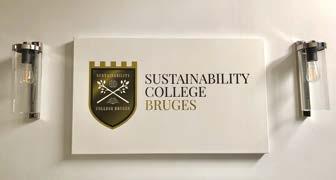
A business school without borders
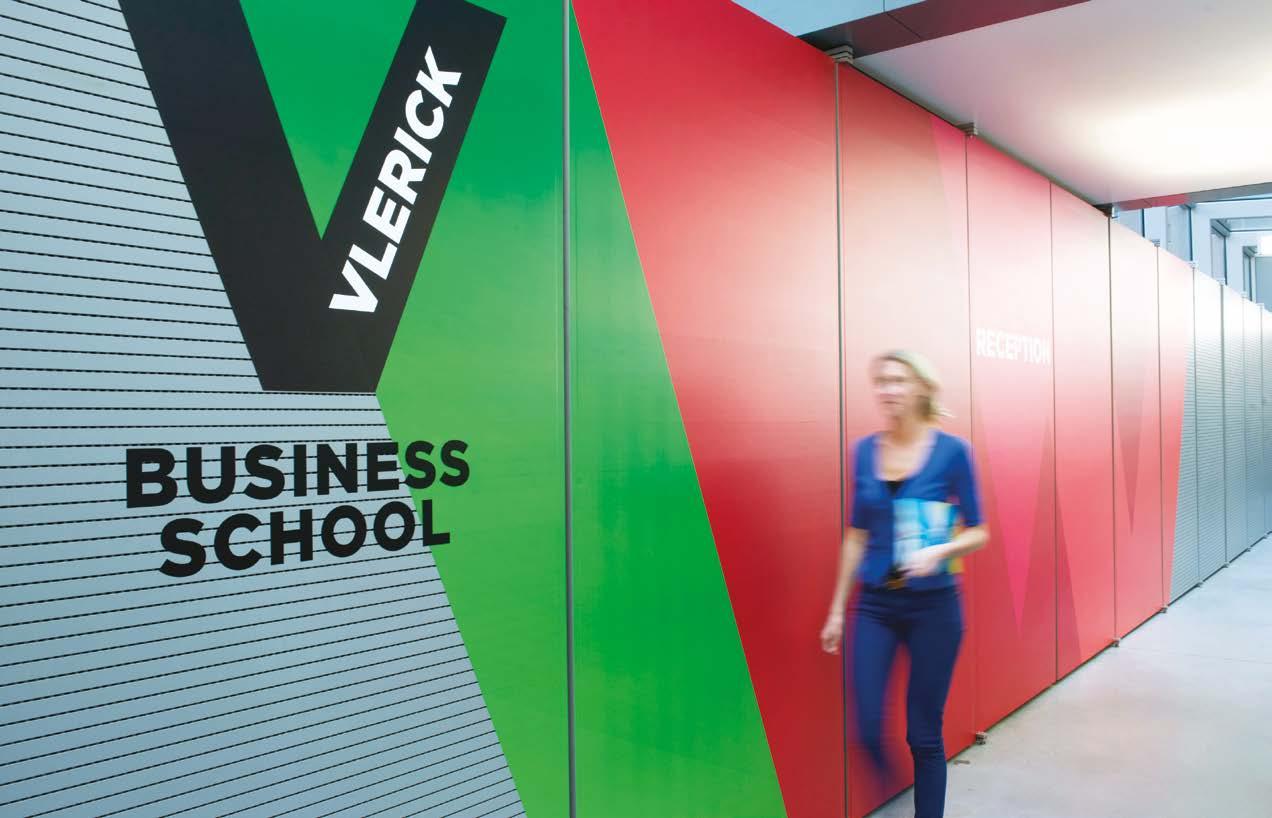
TEXT: ARNE ADRIAENSSENS | PHOTOS: VLERICK
Today’s business scene is global. To prepare yourself well for a life in it, you had better roam the earth while studying. At Vlerick, the Benelux’ best business school, all students cross borders aplenty while improving their business skills. “Studying at Vlerick is so much more than just passively absorbing knowledge.”
Since its foundation in 1953, Vlerick has grown to become one of Europe’s finest business schools. Where its initial goal was to stimulate entrepreneurship and ambition in Belgium, it now does so worldwide. Besides its three Belgian campuses in Brussels, Ghent and Leuven, it has alliances in New Delhi (India), Cape Town (South Africa) and Beijing (China). Here, as well, it provides the same top-level education and research with a strong focus on innovation and digital transformation.
The world’s relevant business crossroads Furthermore, the lion’s share of their prestigious programmes has international allure galore. “Our Global Executive MBA, for example, is an unaltered global experience,” states Marion Debruyne, Dean of Vlerick. “It prepares our students to become tomorrow’s greatest in a unique and dynamic way.” Besides its five topical, online modules (which you can follow from home), the programme consists of six residential weeks where the students and teachers meet at the world’s most relevant business crossroads. Besides the two residential weeks in Belgium, the students head to Spain, Brazil, Silicon Valley and South Korea. “Rather than gathering our international group of students on our own campuses, we prefer taking them to where the action happens and immersing them in it. We have unrooted Vlerick from its Belgian soil and elevated it to a global level. It is impossible to discover the global business scene while staying in one place.”
Personal development and action learning Where the Global Executive MBA is only for business professionals with at least ten years on the counter, younger business prodigies can start an international Vlerick adventure with the Masters in International Management and Strategy, a full-time, ten-month programme with
plenty of freedom. “Like most of our programmes, this Masters is built on two pillars. On the one hand, we focus on personal development. We guide our students towards a successful future, both personally and professionally. On the other hand, we invest in action learning. Studying at Vlerick is much more than passively absorbing information in auditoria. Our students research, participate, undergo simulations, play games… and travel, of course.” During the Masters in International Management and Strategy, students spend over three months abroad during a European Strategic Tour, a month-long global immersion in China and a two-month Global Strategic Consultancy Project in a country of their choosing. These international experiences combined with the great on-campus programme earned the Masters a global top-30-spot in the Financial Times’ prestigious Masters in Management ranking. In terms of language knowledge and international course experience, they even adorn the global top three.
Best of three schools Vlerick’s academic grand cru, however, is its Doctorate in Business Administration (DBA), a unique PhD programme for which the business school joins forces with the prestigious universities KU Leuven and Ghent University. “This intense four-year programme combines the strengths of all three partner schools: it has a strong scientific base, the flexibility of a Vlerick
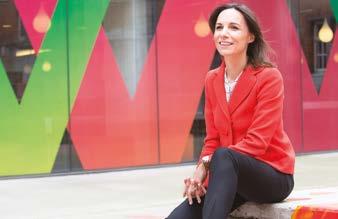
Dean Marion Debruyne.
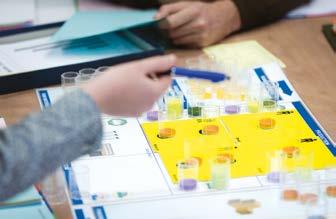
programme and earns you a PhD diploma at the end of the line.” The first two years, you get modules about scientific study and research. The following two years, you spend researching and writing yourself.” Whereas a Doctorate is usually a full-time job, Vlerick’s DBA is meant to be done on top of a career. Ten years of working experience are required to start, yet, the average age of the doctoral students is closer to 40 or 50. “Many successful business people regret not having done a PhD before, to start their career. Our DBA is made for these life-long learners who feel the need to specialise in one aspect of their domain.”
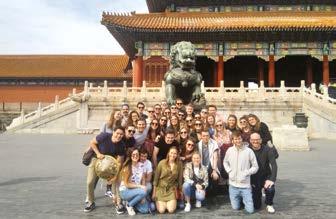
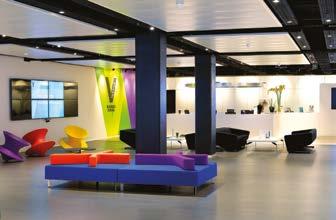
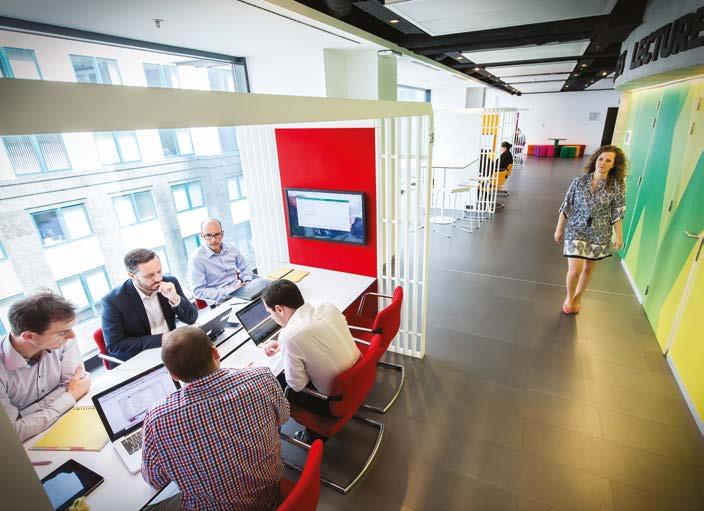
Live, Learn, Leap Rather than offering a linear studying experience, Vlerick takes its students on so-called ‘learning journeys’. “Learning is like going on a holiday. First, you prepare for your trip by researching, exploring and dreaming about what awaits you; next, you have the interactive and exciting phase of studying and gaining knowledge. At most schools, this is where the journey ends. We, on the other hand, add a third chapter: the ripple effect. We want to see our alumni turn their newly gained wisdom into action. Vlerick people are enterprising leaders, who thrive in a fast-changing world.”
Flying the flag ‘Live, Learn, Leap’, Vlerick’s journeys surpass the solely academic aspect of education and become genuine preparation for a blossoming career. “One of my favourite quotes is: ‘There is nothing as practical as a good theory’. An academic approach gives you a frame of reference which you can apply in the field, where everything is a bit foggier and less ideal. Knowing how to handle a situation in perfect circumstances is the ideal way to learn how to handle crises and solve problems. Actually, those two worlds are not as distant as you would think.”
Director Marjan Doom. Photo: Sophie Nuytten
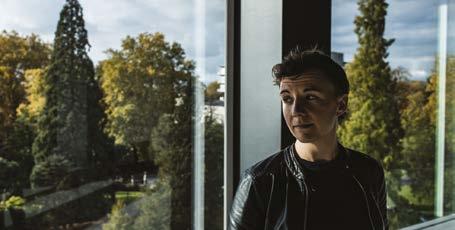

In walking distance from S.M.A.K and MSK Ghent, the city of Ghent will welcome a brand new science museum where facts, mistakes and confusion stand side by side to evoke doubt. The Ghent University Museum will open its doors for the first time on 21 and 22 March 2020.
The GUM will allow visitors to experience a day at the museum in a completely new way. Combining the fact-driven aspects of natural history museums like Brussels’ Museum of Natural Sciences, with the more interactive, learning-based days out at Amsterdam’s NEMO, the GUM looks to build a bridge between the different disciplines within science and aims to do this in its own way.
The idea for the museum formed out of Ghent University’s enormous collection of artefacts. Since the university opened its doors in 1817, it has collected over 400,000 official pieces. With another estimated 200,000 unregistered items, this is easily the largest academic heritage collection in Flanders.
Dare to think
TEXT: ELINE JOLING | PHOTOS: GUM
The driving force behind the museum is director Marjan Doom’s passion to display science in an artistic way. Building on the dialogue between art, science and society, the GUM emphasises the quest for knowledge and wants to depict this as a creative concept. The star pieces are not necessarily the most expensive or oldest items, but rather objects that come with interesting stories that can teach about scientific processes.
“As we see it, the GUM is a pioneer,” says Doom. “A beautiful example of the societal role a university and a science museum can take on. A ground-breaking newcomer to the scene.”
Doom’s display of Leo the finback whale in the Saint Bavo’s Cathedral in 2017 can be seen as a teaser for the museum. The whale ended up on the prow of a ship after being hit, and so found his way into Ghent Harbour in 2015. The university’s 200th birthday saw Leo’s skeleton displayed in the church, accompanied by a poem by the Flemish poet, Peter Verhelst.
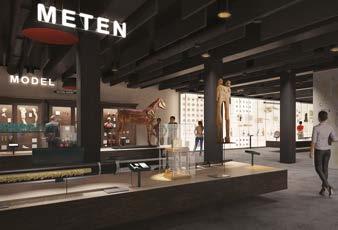
Alongside permanent and temporary exhibitions, the museum will host a vast programme of activities. Those who like to think are invited to visit the museum and engage in a variety of initiatives, including comprehensive lectures, debates and workshops. While the GUM hopes its visitors will come in with a lot of questions, they want them to leave with even more, encouraging them to truly dare to think.
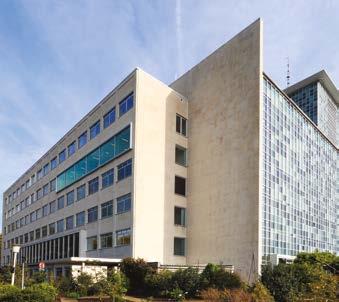
gum.gent Facebook and Instagram: @GUMgent
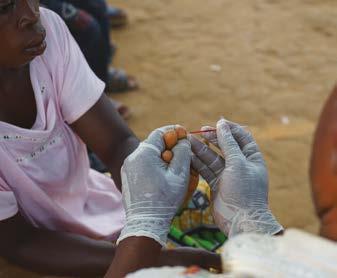
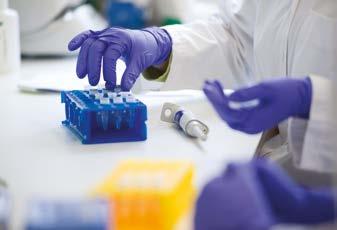
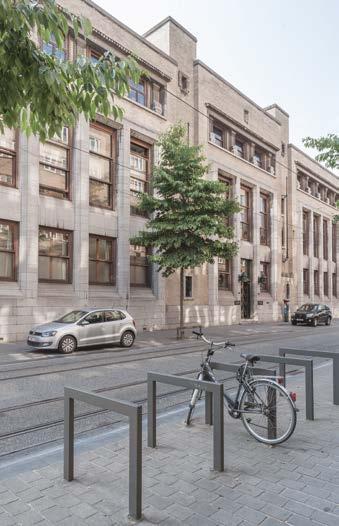
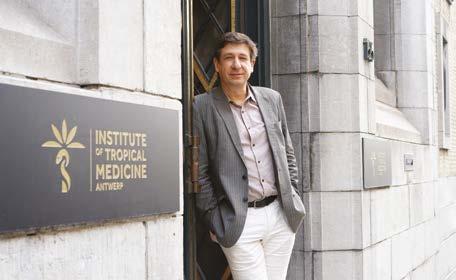
Marc-Alain Widdowson.
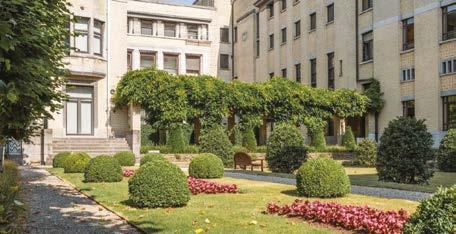
Partnering up for global health
TEXT: COLETTE DAVIDSON | PHOTOS: INSTITUTE OF TROPICAL MEDICINE
The Institute of Tropical Medicine Antwerp is at the forefront of research and education when it comes to global diseases, especially neglected tropical diseases, HIV, TB and emerging viruses. Its research and partnership with countries around the world has helped bolster its medical services and improve public health, according to its motto of “global science for a healthier world.”
Public health is a global concern, and though it affects each community in a unique way, the Institute of Tropical Medicine in Antwerp (ITM) believes that all citizens should be able to access quality care in order to enjoy a healthy life. It is committed to applied scientific research, advanced training and expert medical services for patients both at home and abroad.
As part of its mission, ITM is engaged in a longstanding partnership with 20 countries in Sub-Saharan Africa, Asia and Latin America in order to develop the capacity for better medical research. “We can’t deal with global diseases without research, global partnerships and education,” says Marc-Alain Widdowson, the director of ITM. “This combination is a very important component of our work, from dealing with outbreaks, to researching strategies, to understanding and improving health care access in certain countries.”
In the 1970s, ITM led the way in helping discover the Ebola virus and since the 1980s, it has spearheaded the battle against HIV and TB through research and treatment. Its medical clinic boasts doctors and mental health professionals specialised in tropical diseases and sexually transmitted infections, in addition to several international reference laboratories.
ITM has also been at the forefront of researching emerging viruses transmitted by mosquitoes and other vectors, as well as neglected tropical diseases, such as sleeping sickness, leprosy, worms and Leishmania.
ITM’s work is increasingly important because of changes caused by urbanisation, drug resistance and climate change, which have greatly affected how vectors transmit diseases and how they are spread.
A new Master of Science in Tropical Medicine offered by the ITM creates a distinct path for students wanting to gain a deep scientific knowledge base and real-life professional experience in either the clinical or biomedical science of tropical medicine.
ITM education is aimed at international students – primarily but not exclusively those from low- and middle-income communities – and is supported by the Belgian government. Students are invited to study in Belgium before returning to their home countries to spread their knowledge.
“The goal is to study with us and then go back and bolster the research capacity and health systems in their countries,” says Dr. Widdowson.









